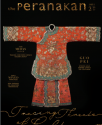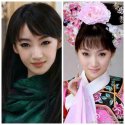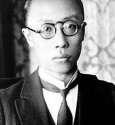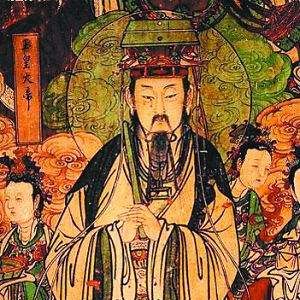Over analyze article but still interesting. I don't believe Li Ziqi is the tool of Chinese propaganda She is just part of movement or yearning for more traditional way of life that is now swept thru China. Notice the increasing popularity of Hanfu among the young. Or the proliferation of museum in Chinese cities. Even traditional wedding costume and ceremony now becoming more popular Over at peranakan magazine China foremost Couturier Guo Pei was fascinated by peranakan wedding attire and draw inspiration from to design more traditional wedding attire. I am really proud that the peranakan preserve and guard the Chinese tradition in time to be rediscover in China. Peranakan life fascinated the Chinese
.
She found it of all places in Paris when in 2010 The peranakan was invited by Louvre museum to exhibit peranakan way of life, fashion and customs And she visit it and fell in love with Penang baba wedding costume
Today, her gowns are a tribute to China’s rediscovery of its own history and heritage, after more than a decade of a government-sanctioned purging of the past. Guo Pei’s couture is a frenzied, feverish proclamation of Chinese identity. It is a celebration of thousands of years of artistic and cultural achievement. These are magnificent creations that negate the identity of their wearer, and instead proclaim loud and proud: China has arrived.
 Country life: the young female farmer who is now a top influencer in China
Country life: the young female farmer who is now a top influencer in China
Adrienne Matei
January 28, 2020, 3:00 AM CST
Country life: the young female farmer who is now a top influencer in China
Since she began posting rustic-chic videos of her life in rural Sichuan province in 2016, Li Ziqi, 29, has become one of China’s biggest social media stars. She has 22 million followers on the microblogging site Weibo, 34 million on Douyin (China’s version of TikTok) and another 8.3 million on YouTube (Li has been active on YouTube for the last two years, despite it being officially blocked in China).
Li’s videos – which she initially produced by herself and now makes with a small team – emphasize beautiful countryside and ancient tradition. In videos soundtracked by tranquil flute music, Li crafts her own furniture out of bamboo and dyes her clothing with fruit skins. If she wants soy sauce, she grows the soybeans themselves; a video about making an egg yolk dish starts with her hatching ducklings. The meals she creates are often elaborate demonstrations of how many delicious things can be done with a particular seasonal ingredient, like ginger or green plums.
There is even a Li Ziqi online shop, where fans can purchase versions of the steel “chopper” knife she uses to dice the vegetables she plucks from her plentiful garden, or replicas of the old-fashioned shirts she wears while foraging for wild mushrooms and magnolia blossoms in the misty mountainside.
While she occasionally reveals a behind-the-scenes peek at her process, Li – who did not respond to interview requests for this article – is very private. By all accounts, she struggled to find steady work in a city before returning to the countryside to care for her ailing grandmother (who appears in her videos).
Recently, Li has been thrust into a wider spotlight by the Chinese government, who seem to have realized her soft power potential. In 2018, the Communist party of China named her a “good young netizen” and role model for Chinese youth. In September 2019, the People’s Daily, a CPC mouthpiece, gave Li their “People’s Choice” award, while last month, state media praised Li for helping to promote traditional culture globally, and the Communist Youth League named her an ambassador of a program promoting the economic empowerment of rural youth.
Related:
As the government increasingly champions her, Chinese citizens have taken to Weibo to question whether Li’s polished, rather one-dimensional portrayal of farm work conveys anything truly meaningful about contemporary China – especially to her growing international audience on YouTube.
They have a point: Li’s videos reveal as much about the day-to-day labor of most Chinese farmers as the Martha Stewart Show does the American working class. As Li Bochun, director of Beijing-based Chinese Culture Rejuvenation Research Institute told the media last month: “The traditional lifestyle Li Ziqi presents in her videos is … not widely followed.”
In reality, many of China’s rural villages have shrunk or disappeared completely in past decades as the nation prioritized urbanization and workers migrated to cities, with research suggesting the country lost 245 rural villages a day from 2000 to 2010. The 40% of China’s population still living in rural areas encompass a huge diversity of experience, yet life can be difficult, with per-capita rural income declining sharply since 2014 and environmental pollution often as rife as in industrial centers. That’s not to say the beautiful forests and compelling traditions of Li’s videos are not genuine – like many social media creators, she simply focuses on the most charming elements of a bigger picture.
So what do Li’s videos reflect about modern China, if not average daily life in the countryside?
For one, they say something about the mindset of her mainland audience – primarily urban millennials, for whom a traditional culture craze known as “
fugu” or “
hanfu” has been an aesthetic trend for a number of years.
“Fugu”, according to Yang Chunmei, professor of Chinese history and philosophy at Qufu Normal University, reflects the “romanticized, pastoral” desires of youth “disillusioned by today’s ever-changing, industrial, consumerist society.” In practice, it looks like young people integrating more traditional clothing into their daily looks, watching historical dramas and following rural lifestyle influencers like Li. (While Li is an extremely popular example of the trend, she’s not the only young farmer vlogging in China right now, and outdoor cooking videos of people making meals with wild ingredients and scant equipment are a genre of their own on Douyin.)






